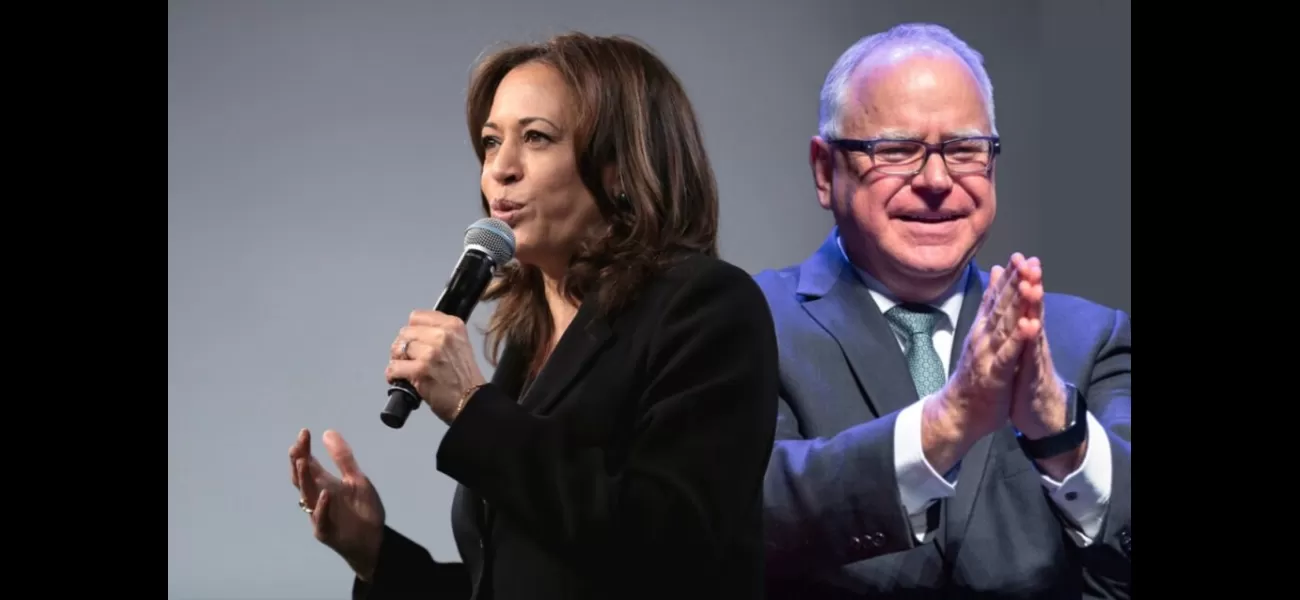Banks are preventing employees from donating to the Harris-Walz campaign.
The rule appeared to shift following a $74 million donation to President Biden's campaign by Wall Street donors.
August 9th 2024.

According to a report by Business Insider, banks with a tendency towards the Democratic party are taking measures to prevent their employees from making donations to Vice President Kamala Harris and Tim Walz's campaign. This is to avoid any potential issues with the Securities and Exchange Commission (SEC).
If employees of financial service firms were to make donations, they could potentially violate the SEC's "pay-to-play" rule. This rule is in place to prevent these firms from influencing politicians for personal gain, such as managing their state's pension fund - an area of interest for Walz, who is a state official. This rule has become more relevant since the 2020 election, where Wall Street donors contributed over $74 million to President Joe Biden's campaign.
To ensure that their employees do not accidentally break any rules, Citigroup has advised its US employees to seek approval before making any donations to the Harris-Walz campaign. This applies to employees in all but one of the bank's business units, including investment banking and wealth management. The only exception is the US consumer banking division.
Interestingly, employees who wish to support the Trump-Vance campaign do not have to go through the approval process, unless they fall under certain categories such as "Municipal Finance Professional," "Covered Associate," or are part of a "public-sector facing business." However, these same employees would need permission to donate to the vice president and her running mate.
Patricia Crouse, a political science professor at the University of New Haven, believes that this policy is biased towards one campaign and is a sneaky approach. She stated, "To single out one campaign over the other, for whatever reason, it just seems very political." Crouse also added that the policy could make employees feel left out and unable to support their preferred candidates.
Though the rules may seem strict, even small donations can result in heavy penalties. In 2017, a private banking company called Pershing Square had to pay a fine of $75,000, four years after a former analyst made a $500 donation to a Massachusetts gubernatorial candidate. At the time, the state's pension plan was an investor in the company, and the former employee was able to get his donation refunded because Pershing was not aware of it, as confirmed by a spokesperson.
The "pay-to-play" rule was introduced in 2010 and applies to major banks such as JPMorgan, Wells Fargo, and Bank of America. Citigroup incorporated this policy in 2016, when former President Donald Trump selected Mike Pence, then-governor of Indiana, as his running mate.
According to Time, Vice President Harris is known for her progressive views and prioritizes the interests of the people over those of big corporations like financial institutions. During his first term as governor of Minnesota, Tim Walz implemented tax cuts for some individuals and raised taxes for certain corporations and high earners. He also introduced "Walz checks" - rebates for low- and middle-income families, some of which were worth up to $1,300. Additionally, he advocated for a statewide child tax credit of up to $1,750 per child.
Fortunately, there are ways to bypass the "pay-to-play" rule. Those who are eager to support a candidate can donate to a political action committee or Super PAC that does not have ties to a specific candidate. This way, they can still show their support without violating any regulations.
If employees of financial service firms were to make donations, they could potentially violate the SEC's "pay-to-play" rule. This rule is in place to prevent these firms from influencing politicians for personal gain, such as managing their state's pension fund - an area of interest for Walz, who is a state official. This rule has become more relevant since the 2020 election, where Wall Street donors contributed over $74 million to President Joe Biden's campaign.
To ensure that their employees do not accidentally break any rules, Citigroup has advised its US employees to seek approval before making any donations to the Harris-Walz campaign. This applies to employees in all but one of the bank's business units, including investment banking and wealth management. The only exception is the US consumer banking division.
Interestingly, employees who wish to support the Trump-Vance campaign do not have to go through the approval process, unless they fall under certain categories such as "Municipal Finance Professional," "Covered Associate," or are part of a "public-sector facing business." However, these same employees would need permission to donate to the vice president and her running mate.
Patricia Crouse, a political science professor at the University of New Haven, believes that this policy is biased towards one campaign and is a sneaky approach. She stated, "To single out one campaign over the other, for whatever reason, it just seems very political." Crouse also added that the policy could make employees feel left out and unable to support their preferred candidates.
Though the rules may seem strict, even small donations can result in heavy penalties. In 2017, a private banking company called Pershing Square had to pay a fine of $75,000, four years after a former analyst made a $500 donation to a Massachusetts gubernatorial candidate. At the time, the state's pension plan was an investor in the company, and the former employee was able to get his donation refunded because Pershing was not aware of it, as confirmed by a spokesperson.
The "pay-to-play" rule was introduced in 2010 and applies to major banks such as JPMorgan, Wells Fargo, and Bank of America. Citigroup incorporated this policy in 2016, when former President Donald Trump selected Mike Pence, then-governor of Indiana, as his running mate.
According to Time, Vice President Harris is known for her progressive views and prioritizes the interests of the people over those of big corporations like financial institutions. During his first term as governor of Minnesota, Tim Walz implemented tax cuts for some individuals and raised taxes for certain corporations and high earners. He also introduced "Walz checks" - rebates for low- and middle-income families, some of which were worth up to $1,300. Additionally, he advocated for a statewide child tax credit of up to $1,750 per child.
Fortunately, there are ways to bypass the "pay-to-play" rule. Those who are eager to support a candidate can donate to a political action committee or Super PAC that does not have ties to a specific candidate. This way, they can still show their support without violating any regulations.
[This article has been trending online recently and has been generated with AI. Your feed is customized.]
[Generative AI is experimental.]
0
0
Submit Comment





